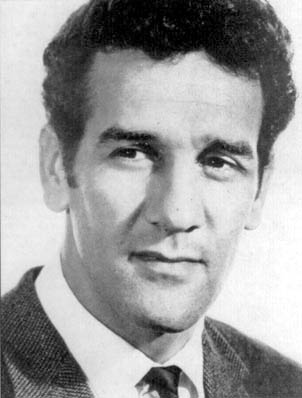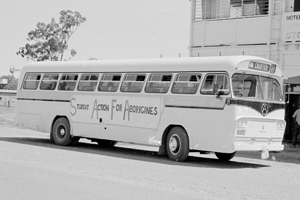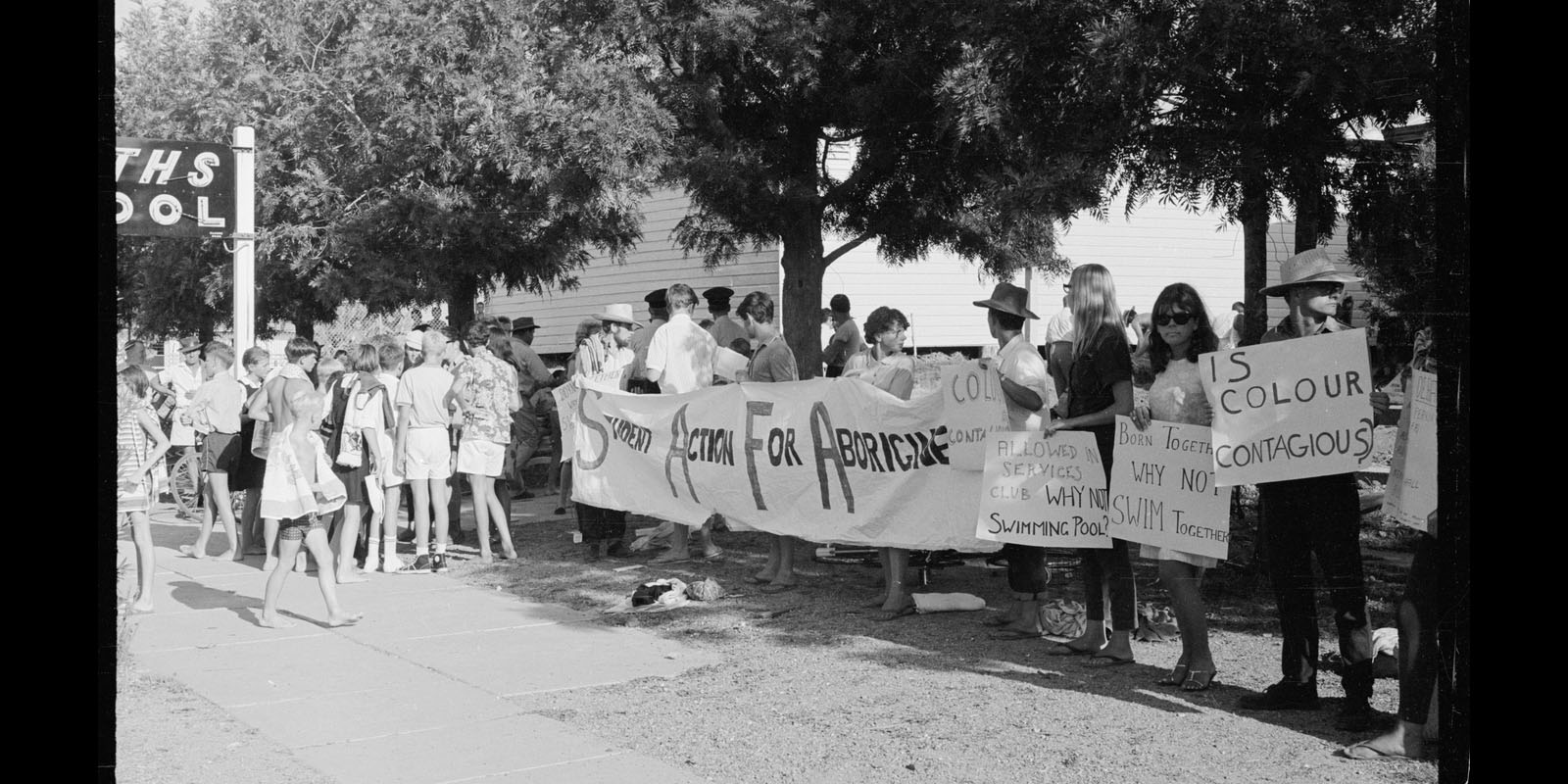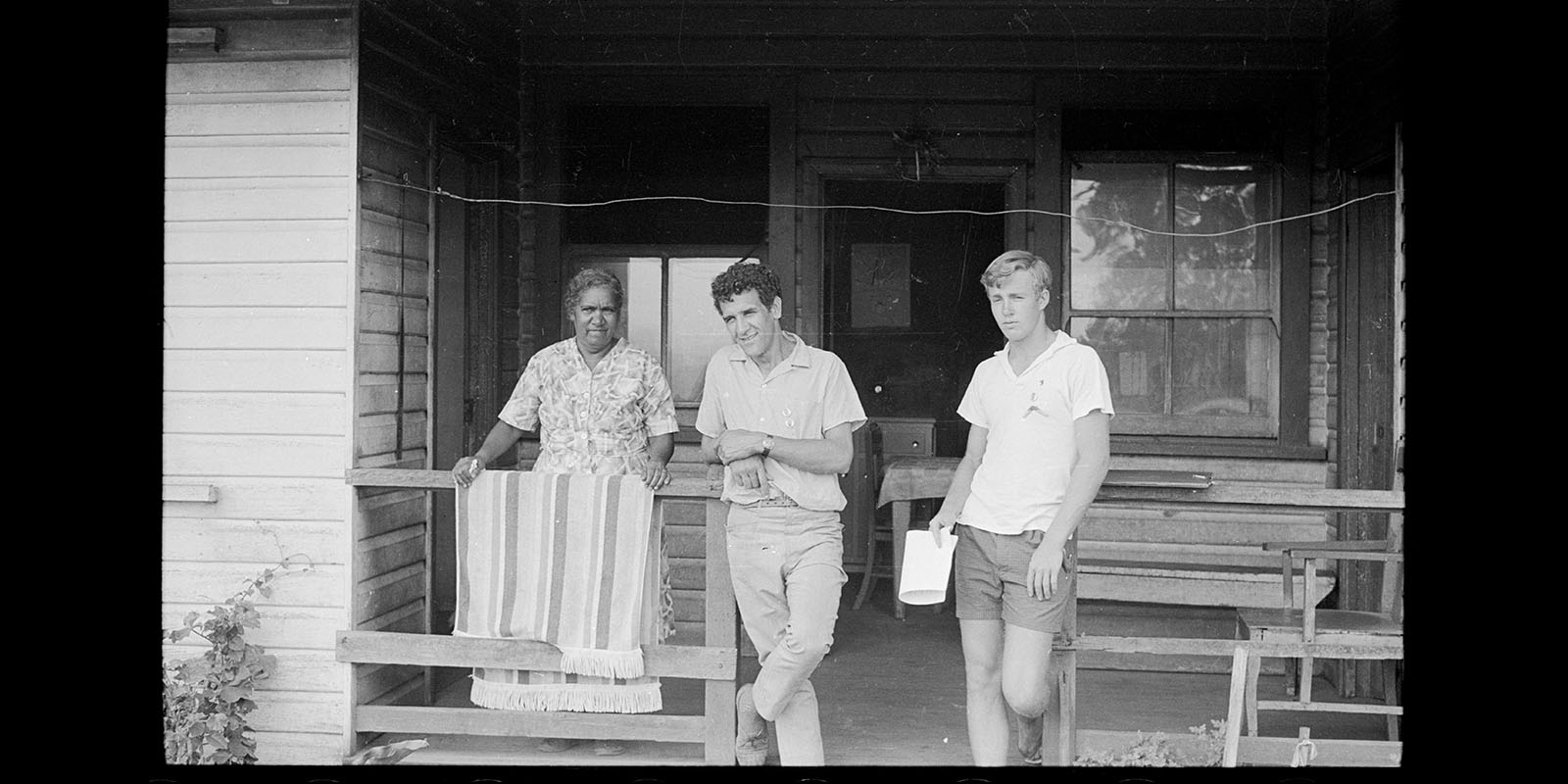The 1965 Freedom Ride – led by Uncle Charlie Perkins and his fellow students at the University of Sydney – was a significant event that drew national and international attention to poor living conditions faced by Aboriginal people and the racism that was rife in New South Wales country towns.
Uncle Charlie Perkins

Charles ‘Charlie’ Nelson Perkins was born near Alice Springs in 1936 to Hetti Perkins and Martin Connelly. His mother was Arrernte and his father was Kalkadoon and Irish. He went to school in Adelaide but frequently made the trip home to Alice Springs. After initially training as fitter and turner, his talent for soccer led him to play in England in 1957.
Uncle Charlie began studying at the University of Sydney is 1963 and graduated with a Bachelor of Arts in May 1966. It was during his time at University that he emerged as a leader and advocate for Aboriginal people. After graduating he played a strong role in setting up the Foundation for Aboriginal Affairs in Sydney. Uncle Charlie was known throughout his life as a powerful speaker and staunch defender of Aboriginal rights. In 1987 he was awarded the Order of Australia for his achievements.
Student Action for Aborigines (SAFA)

SAFA Bus. State Library of New South Wales.
During the 1960s, many students were becoming involved in various protest movements fighting for social change including the protests against the Vietnam War and the feminist movement.
However, many white Australians believed racism to be an issue that only existed overseas. In part because of this, in 1964, Student Action for Aborigines (SAFA) was formed by University of Sydney students as an organisation to highlight the issue of racism in Australia. Uncle Charlie, who was one of only two Aboriginal students at the University at the time, was elected as the first president of SAFA.


Image: People gathered for Student Action for Aborigines protest outside Moree Artesian Baths. Mitchell Library, State Library of New South Wales and Courtesy SEARCH Foundation.
Freedom Ride
Well, we hired the bus. We placed a banner along the front and prepared to start off from Sydney – Uncle Charlie Perkins
Looking to see for themselves the reality of racism in country towns, SAFA organised a bus tour of Western and Coastal New South Wales in February 1965. The Freedom Ride toured through Walgett, Gulargambone, Kempsey, Bowraville and Moree. Throughout the trip the students were confronted with shocking conditions and discrimination being faced by Aboriginal people, including poor health, housing, education and blatant racism and segregation.
Frequently during the ‘ride,’ SAFA witnessed Aboriginal people being barred from community spaces and businesses including swimming pools, theatres and cafes. Shocked by what they were witnessing, SAFA organised demonstrations to protest the treatment of Aboriginal people at multiple places, including the Walgett Returned Services League, swimming pools in Moree and Kempsey and the Bowraville picture theatre. In doing this, they frequently received hostility from white locals.
Throughout the Freedom Ride, the protests of the students and the reactions of the townspeople were captured by the media. In Walgett, one of the students filmed a group of cars running the SAFA bus off the road. They also captured footage of the president of the Walgett Returned Service League Club saying he ‘would never allow an Aboriginal person to become a member.’
These blatant and severe racist acts were broadcast on TV news, showing millions of Australians who had never faced racism the extent of the problem. The footage and media reports increased pressure on the Government to act to support Aboriginal rights. The Freedom Ride also gained international media attention, with the New York Times reporting on it.
The problem is out in the open now - Uncle Charlie Perkins to a crowd of 200 attending the 1965 Federal Council for the Advancement of Aborigines and Torres Strait Islanders (FCAATSI) conference in Canberra
In Moree, the actions of the students centred on the local swimming pool. The Moree Pool had numerous racist policies in place, banning Aboriginal children from swimming at certain times and requiring them to shower before getting in the pool. The pool became a source of tension as SAFA protested the segregation and swam in the pool with local Aboriginal kids.
Then we went to the swimming pool. The manager refused to let the six Aboriginal boys I and so we held up our posters and signs. After about 25 mins they let the boys in. Then Charlie arrived with a bus load of 21 Aboriginal boys and they had to all be let in – Ann Curthoys
The Freedom Ride was hugely significant in Australian history as it raised awareness among the general public about the racism that Aboriginal people were confronting everyday. By gaining such significant media coverage, racism was an issue that could no longer be ignored and added to the mounting campaign for rights and equality for Aboriginal people.
SAFA engaged in some further visits to country towns later in the year but, by the end of 1966, the organisation came to an end.


Image: Uncle Charles Perkins and Bowraville resident. Mitchell Library, State Library of New South Wales and Courtesy SEARCH Foundation.
Uncle Charles Perkins & Others On Freedom Ride
Timeline of the Freedom Ride
- July 1964 – SAFA is formed
- Feb 12th 1965 – the Freedom Ride begins and leaves Sydney
- Feb 13th – the students arrive in Wellington and conduct a series of surveys on living conditions of Aboriginal people
- Feb 14th – the students arrive in Walgett and participate in a strike against the RSL for not allowing membership or entry to Aboriginal Ex-Servicemen
- Feb 15th – the bus is pushed off the road by an unknown driver, the students return to Walgett
- Feb 16th – the students arrive in Moree and protest the banning of Aboriginal people from the swimming pool, eventually the Aboriginal Community are granted access to the pools
- Feb 19th – the bus is heading for Lismore but they turn around and go back to Moree after hearing the swimming pool ban has been reinstated
- Feb 23rd – the students arrive in Lismore and conduct more surveys
- Feb 24th – the students arrive in Kempsey and conduct more surveys and protest the local ban on Aboriginal people swimming in the pool
- Feb 26th – the students arrive back in Sydney
Film/TV
Freedom Ride – Blood Brothers (Rachel Perkins)
- Aboriginal filmmaker Rachel Perkins portrays her father's story in Freedom Ride, the first episode in the SBS series Blood Brothers (1993).
Books
Sources used in writing this article:
- Commemorating the Freedom Ride, The Australian Institute of Aboriginal and Torres Strait Islander Studies
- Charles Perkins, National Museum Australia
- Perkins, Charles Nelson (Charlie) (1936–2000), Indigenous Australia
- Dr Charles Nelson Perrurle Perkins AO, The Charlie Perkins Scholarship Trust
